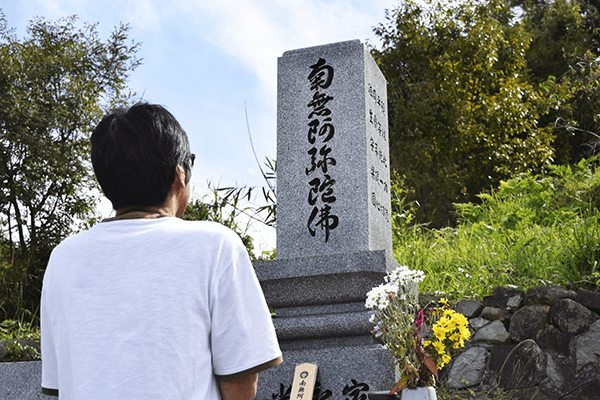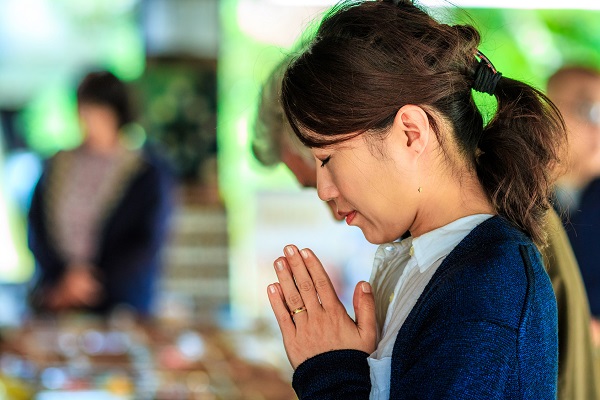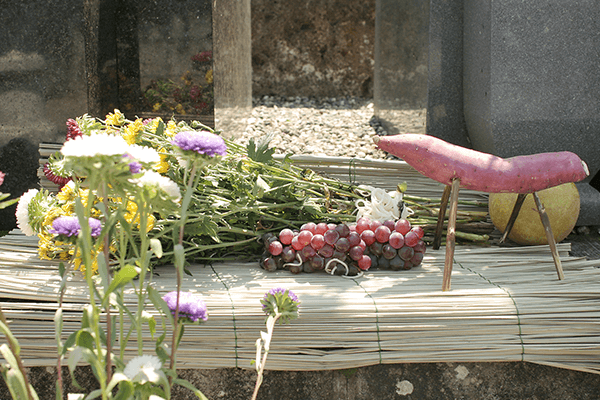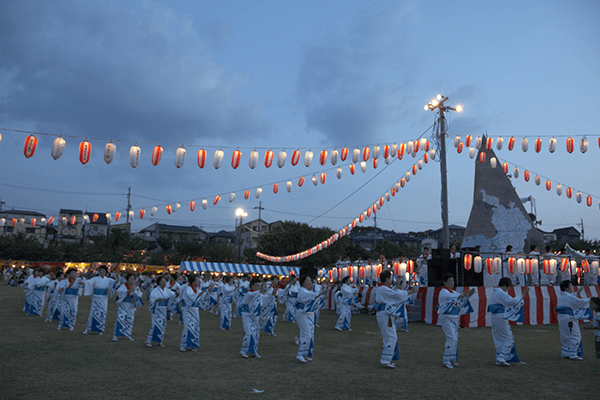INTRODUCE
Paying respects to ancestors is a big part of Japanese culture, but not every culture is like that. You may get many questions about the importance of ancestors from foreign friends, so it’s good to know how to explain it.

PRESENT
STEP A EXPRESSIONS
Go over the expressions with your tutor and answer the questions.

1. The phrase those who have passed on refers to people who have died.
Kazu went to the cemetery to pray for those who have passed on in his family.
Q: Where do Japanese people usually go to honor those who have passed on?

2. The spirits of something/someone refers to the part of a thing or person that continues to exist even after death.
Aiko believes that it’s important to honor the spirits of the dead.
Q: When do Japanese people pray for the spirits of their ancestors?

3. To give offerings means to offer something as a sign of respect.
Daisuke gave offerings of fruit at the grave of his loved ones.
Q: How often do Japanese people give offerings to their ancestors?
STEP B PRONUNCIATION
| Phrase | Example |
|---|---|
passed on / pas-ton / |
Lighting a candle is a good way to honor those who have / pas-ton /. |
UNDERSTAND
READING
Andy, Naoki’s Australian coworker, got an email from Naoki.
 |
Hey, man!
You know how we were all talking about Obon vacation yesterday and you sent me a message asking what Obon was? Sorry for not replying! I meant to write back after my meeting but totally forgot until just now. Anyway, I hope this article helps.
~ Naoki
Obon is one of the busiest travel seasons in Japan. It usually takes place between July and August every year. It’s a time for people to go back to their hometowns and pray for those who have passed on.
During Obon, people believe that the spirits of their ancestors return to this world to visit their loved ones. To welcome them, people hang lanterns in front of their houses to guide the spirits back to their homes. They give offerings of rice, fruit, and handmade sweets inside their homes and at temples. They also visit the graves of their ancestors and clean them.
At the end of the Obon season, people put floating lanterns on lakes, rivers, and other bodies of water to guide the spirits back to where they came from.
TRIVIA
Did you know how the Obon Festival started? According to myth, Mokuren, a monk, did many good deeds to save his dead mother’s spirit from suffering and it worked! To celebrate, he did the Bon dance, a dancing style that people now perform every year during the Obon Festival.

PRACTICE
STEP A EXERCISE
Fill in the blanks using the expressions in the box. The form of some expressions may need to be changed.
- In Mexico, the scent of the marigold flower is believed to lead _____ back to their houses.
- Jesa is a ceremony in Korea where people remember ____ on the day of their death.
- Indian families ____ to crows because they believe that their ancestors return to this world as birds.

STEP B EXERCISE
Complete the dialogues using the expressions in parentheses and your own information. The form of some expressions may need to be changed.
1.
Tutor: Do you think people who have died watch over us?
Student: (those who have passed on)
2.
Tutor: What things can I offer at a temple?
Student: (give offerings)
3.
Tutor: Are you afraid of ghosts?
Student: (the spirits of something/someone)

CHALLENGE
Challenge 1
You and your foreign friend love to read a blog called One Way Ticket. Read the latest blog post. Then, talk with your friend about it.
Today's Expressions
- those who have passed on
- the spirits of something/someone
- give offerings
One Way Ticket: An Australian’s Life in the Land of the Rising Sun
A Weekend in Kumamoto
August 15

My girlfriend Yumi and I visited her parents during Obon last week. They live in Kumamoto. It was my first time to meet them, but thankfully, they welcomed me with open arms!
Their house was traditional and very different from my friends’ homes back in Tokyo. For one, they have an altar inside their home! I believe it’s called a butsudan. It looks like a small cabinet with spirit tablets inside. Yumi’s mother put candles, lanterns, and incense burners inside it. Yumi told me that a lot of Japanese people have them to remember those who have passed on in their family. And because it was Obon, they gave offerings of rice, fruits, and flowers in front of the butsudan. My girlfriend’s mother said that the food is their way of asking the spirits of their ancestors for good fortune and protection from illnesses.
Challenge 2
Discuss your ideas.
 If Time
If TimeAllows
1 ANCESTORS |
2 GIVING OFFERINGS |
3 OBON |
|---|---|---|
|
1 ANCESTORS
|
2GIVING OFFERINGS
|
3OBON
|
FEEDBACK
I can read and understand an article about the importance of ancestors in Japan.
LESSON GOAL ACHIEVEMENT
-
4
Very GoodCould complete the task with ease
-
3
GoodCould complete the task with some clarifications
-
2
FairCould complete the task with additional instructions
-
1
PoorCould somehow complete the task with difficulty
PERSONALIZED FEEDBACK
- RANGE
the ability to use a wide variety of vocabulary - ACCURACY
the ability to speak correctly - FLUENCY
the ability to speak smoothly without pauses or fillers - INTERACTION
the ability to manage a conversation

